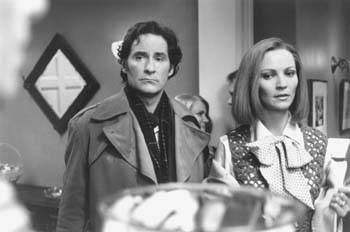The Frost of Living
Catching a Cold: Kevin Kline and Joan Allen in 'The Ice Storm.'
'The Ice Storm' puts a moralistic chill on the '70s
By Terri Sutton
ANG LEE PRESENTS the sinful '70s as if they were a nasty dream that, with a few repentant tears, we can safely put behind us. A 16-year-old boy goes to sleep on a train, envisions the atomized death of the American family, and awakens two hours later to greet his own tribe, gratefully reunited in the nightmare's wake.
In between, dream logic reigns: a jump-cutting narrative, multiple points of view, an anticipatory, eerie momentum and the unyielding weight of key symbols. There's pleasure to be had by falling into this chilly stream, but it's a masochistic bliss. The Ice Storm climbs and climaxes with punishment.
And that reproof is very specific. Lee unveils a Promise Keepers' moralistic scenario: a wandering father (Kevin Kline), who offers wishy-washy instruction to his children and avoids his wife's righteous pain; the cuckolded good wife (Joan Allen, in her patented role) driven to shoplifting by her misery; the unformed children (Christina Ricci and Tobey Maguire) following the example of their hapless parents.
This family, the Hoods, is mirrored by the Carvers, whose bored, smart missus (Sigourney Weaver) sleeps with Mr. Hood, ignores her passive husband and ineffectually disciplines her troubled sons. The tragedy, not coincidentally, comes to the Carvers, but the grief, as Lee showcases it, belongs to the fathers. Their sobs, their regret and their loss are what matter here.
Of course, Lee did not originate the plot; novelist Rick Moody did. Yet somehow his book does not cram the air with the self-aggrandizing apologia of patriarchs. To some extent, Moody can thank his timing: The Ice Storm was published in 1994, before the Million Man March (Machs I and II) made male contrition trendy. For the most part, though, it's Moody's casually perceptive, sardonic prose that balances his story. Not only do his characters exhibit more twists than Lee allows, the novel maintains a far quirkier and less relentlessly bleak tone.
Lee's movie has a cool blue look to it that goes beyond the call of duty. Yes, the ice storm that finally descends on the affluent suburbanites signifies greatly of their unloving, goose-bumped souls. But does that point require quite so many shots through windshields, windows and clear bowls? So many scenes lighted by TV screens and refrigerators? So much of the Philip Glassian score, with its eternal crystalline gurgle? The methodical distance between the characters--and between the viewer and the characters--makes any eventual connections across those barren spaces appear dubious, even farcical--unless emotional frigidity really resonates with you.
I find it amusing that the same critics who experienced A Thousand Acres as an unrelieved bummer now embrace The Ice Storm without similar reservations. Many bad things happen in this movie, one after the other, but here no one weeps--that is, not until the fathers finally break and melt the ice. The melodramatic Thousand Acres and tight-assed Ice Storm actually represent two versions--stereotypically female and male, respectively--of the same story: the sins of the parents visited upon the children.
THOSE CONFUSED children grant The Ice Storm what little warmth it has; Lee needs them to represent battered innocence against the cynical maneuvers of the parents. While Ricci's Wendy Hood and Elijah Wood's Mikey Carver experiment with the adults' sexual games, the film argues for their fear and reluctance: they play because they think they're supposed to.
Ricci, Wood and Adam Hann-Byrd, as Mikey's little brother, Sandy, seem to vibrate with raw sensitivity--they're as open as their parents are barricaded. The Ice Storm's touchstone scene puts Wendy and Sandy to bed, naked souls not doing anything but holding each other.
But why, we should ask, is platonic compassion the highest ideal in Lee's retro world? Why show sex as always squeakily uncomfortable and, as Mr. Carver shrieks, "awful!" Why mock desire? Beneath Lee's criticism of his characters' self-absorption lies another, stickier reproof of a '60s notion that bloomed like cancer in the '70s: insurgent pleasure.
Moody's novel gleefully observes the sexual revolution destabilizing WASP repression and the fracturing of suburban culture--he's cheering, even while he counts the casualties. Lee, all of whose films celebrate the continuance of family tradition, exorcises that anarchic spirit.
There is no sense in The Ice Storm that, per A Thousand Acres' domineering Daddy, the pre-'70s family may also have been an unhealthy place for children. Like the Promise Keepers, Lee just wants the post-revolution dream of pleasure--featuring sexually strong women, expanded/exploded families, acknowledged teen desire--to end.
Lee, with Kline's Ben Hood, mourns the father's failure to control himself and his clan. And Lee, with his coldly formal movie, corrals the distaff sheep and directs their eyes again to the redeemed shepherd, crying pious, purposeful tears.
[ Metro | Metroactive Central | Archives ]

Adger W. Cowans
The Ice Storm (R; 112 min.), directed by Ang Lee, written by James Schamus, based on the novel by Rick Moody, photographed by Frederick Elmes and starring Kevin Kline.
From the Nov. 6-12, 1997 issue of Metro.
![[Metroactive Movies]](/movies/gifs/movies468.gif)